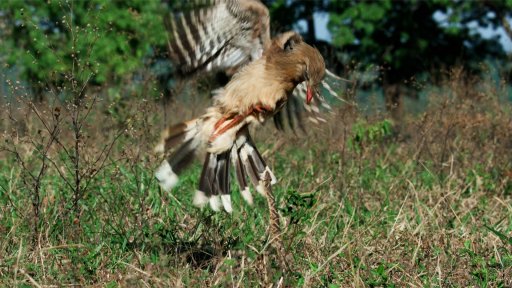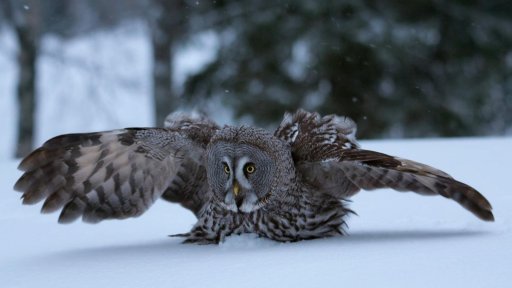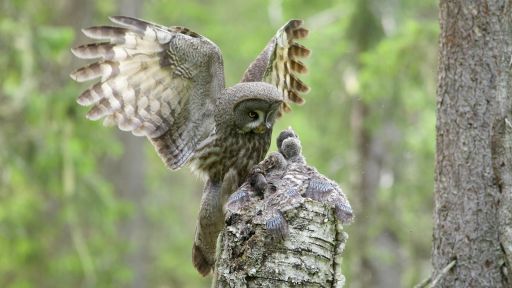The remote Falkland Islands in the South Atlantic are home to the world’s most intelligent bird of prey, the striated caracara. In this behind-the-scenes film, a camera team travels there to reveal the surprising ways these curious raptors survive.
Features



(wave crashes) - [Narrator] Making a film about birds of prey took the crew to 14 countries over two years.
Of all the amazing behaviors they witnessed, one raptor did things a little differently: an island castaway with a little known superpower.
(plane buzzing) The team traveled to the remote Falkland Islands in the South Atlantic.
Home for the next few weeks.
Sea Lion Island.
Three square miles and uninhabited for half the year.
But home two elephant seals, thousands of penguins, and a unique bird of prey: the striated caracara.
(caracara squawking) When naturalist Charles Darwin visited the Falklands in 1833, he described them as extraordinarily tame and fearless... (penguin squawks) very mischievous... (caracara screeches) (seal barks) and inquisitive.
(caracaras squawking) quarrelsome and passionate.
(caracara squawking) And it didn't take long for the team to find out exactly what he meant.
Wherever they went, caracara followed... (caracara squawking) taking a keen interest in all their equipment.
- They're like children.
You can't turn your back for a minute, or they're in their bags and trying to undo the zip.
Hopefully we get some natural behavior at some point.
(caracara squawking) - [Narrator] Sadly, that wasn't to be the case.
Caracara are persistent if nothing else.
It took days for the island's animals to lose interest in their strange human visitors.
But with their own perseverance, the crew began to pick up a few natural interactions.
(playful music) (penguin squawking) As they did, they were fascinated by the caracara's usual lifestyle, as well as the resourceful ways in which they found food.
- What's really interesting is you can see the difference between young and old.
The more experienced birds are just targeting this wound on an elephant seal's tail.
But the youngsters are just jumping around all over the place, risking getting hit.
(seal roars) They're picking at the elephant seal's skin.
I even saw one try and pick some snot from an elephant seal's nose.
It's a bit grim, but it kind of shows just how resourceful you have to be to survive here.
Even now, there's an adult bird just raking through the seaweed, eating what it can find.
They're quite unlike any other raptor we've filmed so far.
It's amazing.
- [Narrator] What made these raptors so different?
The team wondered what secrets might lie behind their success.
- We've been so impressed with the caracara, and we wanna find out a bit more about them.
Now, intelligence isn't something that's necessarily associated with many raptors, but seeing the way these guys are and seeing the kind of things they have to do to survive, we're gonna set up a few very basic and really very non-scientific tests, but just to find out if they can pass the sort of test that something like the crow is known for.
(caracaras squawking) - [Narrator] Could caracara's pass a widely used intelligence test?
- We're just gonna use what we've got, really.
So we've got a pipe, some string and a couple of jars, and we'll just see what we can throw together.
- [Narrator] The idea was to see if caracara could reach food trapped in a jar.
- We've got a license to do this properly, 'cause what we're gonna do is sacrifice our dinner to tie it to the string to see if the caracara could work out that you need to pull on the string to get the reward.
Very basic, but let's see how we go.
- [Narrator] The first test subject was already waiting.
(curious banjo music) Could it find a way to reach the meat?
Having never seen anything like this before, the caracara headed straight for the wrong end.
But true to its character, it didn't give up, quickly finding its way to the string.
Success took no time at all.
And the caracara made off with the crew's dinner.
- That first test went surprisingly well.
A young caracara came in and solved it within a couple of minutes.
- [Narrator] But this led to more questions.
Was the caracara simply pulling the string, or did it recognize that it was attached to the meat?
- We're gonna try something new now to test whether or not the caracara actually recognizes that pulling the string gives him a reward.
We're putting out two pipes.
One has the meat in it.
One doesn't.
He can see which one it is.
If the bird pulls on the string that has the meat straight away, we know that he recognizes that string will give him that reward, and that is... (caracara squawking) Here comes one now.
Which may show a higher degree of intelligence.
Things like crows and ravens can all pass this test, so let's see how the caracara does.
- [Narrator] Two pipes now set up.
The caracara couldn't wait.
It wasted no time at all, heading straight for the right string.
- Okay, so that all went surprisingly well.
On the first test, he came in, passed it within a couple of minutes.
Second time round, he had a pretty good look at it, and then pulled on the string with the one that had the meat in it, and he got the reward.
(seal snorts) I'll stress that we are not...
Excuse the elephant seals.
I'll stress that we are not scientists, so, whether or not raptors are intelligent and caracara are intelligent, I'll leave that to someone far smarter than I.
But from what we've seen, they seem pretty switched off, and they're at least very inquisitive and extremely resourceful.
We've been really, really impressed with these birds, and it's been a privilege to hang out with them and the noisy elephant seals for a few weeks.
- [Narrator] Of all the incredible raptors the crew filmed, striated caracara stood out as the most unusual.
And intelligence may well be the secret to surviving cast away on the remote Falkland Islands.
(caracara squawking) From roaming in gangs to living off pond weed and elephant seal snot... (seal growls) its little wonder they left such an impression on Charles Darwin.
As they do on any visitor to these islands today.
(propellor buzzing) (upbeat banjo music)
